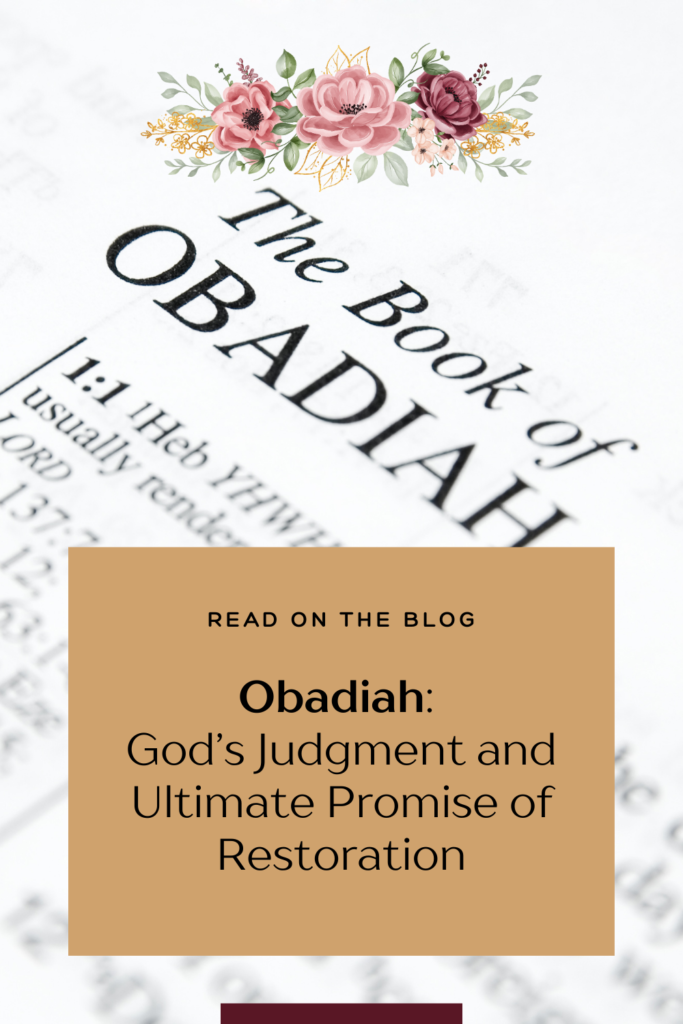The Book of Obadiah is the shortest book in the Old Testament, containing only one chapter with 21 verses. Despite its brevity, it contains a powerful message of judgment against Edom, a neighboring nation to Israel, and a promise of restoration for God’s people. Obadiah’s prophecy speaks of the consequences of pride, betrayal, and violence against God’s people. It also points toward a future time when God’s kingdom will triumph and His justice will prevail. In this post, we’ll explore the themes of Obadiah, its significance, and how the message connects to Jesus Christ.
Background of Obadiah
Obadiah was a prophet who received a vision from God concerning the nation of Edom. Edom, descended from Esau, was a neighbor to Israel, and the two nations had a long history of conflict. Edom rejoiced in Israel’s misfortune and participated in plundering and betrayal during their distress.
So, Obadiah pronounces judgment on Edom’s pride, violence, and betrayal, while offering hope for Israel’s restoration. Obadiah’s prophecy likely came after Babylon destroyed Jerusalem in 586 B.C., when Edom worsened Israel’s suffering. God declared that He would punish Edom for contributing to Israel’s downfall.
Where You Can See Jesus in Obadiah
In God’s Judgment: Just as God judged Edom for their pride and betrayal, Jesus will also bring judgment to the world when He returns. In the New Testament, we see that Jesus will judge all nations. He will bring justice to the earth (Matthew 25:31-46, Revelation 20:11-15). Jesus, as the righteous judge, will hold all people accountable for their actions.
Promise of Restoration: Obadiah points to Jesus Christ, who secures victory over sin and promises eternal restoration.
In the Day of the Lord: The “Day of the Lord” in Obadiah points forward to the future return of Christ. Jesus will return in glory to bring justice, judge the wicked, and restore His people to their rightful place. This event will mark the culmination of God’s plan of redemption and the fulfillment of His promises to His people.
Key Themes in Obadiah
- Pride and Humility: Obadiah warns against pride, as it leads to downfall. Jesus teaches us humility, saying, “Whoever exalts himself will be humbled, and whoever humbles himself will be exalted” (Matthew 23:12). As followers of Christ, we are called to walk in humility and rely on God, knowing that pride can lead to destruction.
- Betrayal and Mercy: Obadiah condemns Edom for betraying Israel during their time of need. Jesus, however, exemplifies mercy and forgiveness, calling us to love our enemies and pray for those who persecute us (Matthew 5:44). We are called to show mercy and compassion, even when others may wrong us.
- The Day of the Lord: The Day of the Lord is a time of judgment and restoration. Jesus’ second coming will fulfill this promise, when He will bring justice to the earth and restore all things. As we live in anticipation of this day, we are reminded to live in righteousness, awaiting the return of our Savior.
- Restoration and Victory in Christ: Obadiah speaks of Israel’s future restoration, and Jesus is the one who ultimately brings about this restoration. Through His sacrifice, Jesus reconciles us to God and promises us victory over sin and death. The hope of restoration is found in Christ alone, who will make all things new.
How We Can Apply Obadiah to Our Lives Today
- Examine Our Hearts for Pride: Like Edom, we must examine our hearts for pride and humble ourselves before God.
- Show Mercy and Compassion: We are called to show mercy, love our enemies, and serve those in need, reflecting God’s heart.
- Live in Light of the Day of the Lord: Live in anticipation of Christ’s return, striving for righteousness and sharing salvation with others.
- Find Hope in Jesus’ Restoration: Obadiah’s promise points to Christ’s ultimate restoration, offering hope as we look forward to His return.
Conclusion
Obadiah reminds us of God’s justice, pride’s consequences, and betrayal’s cost. It promises restoration through Jesus Christ.
We are called to humble ourselves, show mercy, and live with hope in Christ’s return and victory. Let us live justly, love others as Christ loved us, and look forward to God’s promises in His kingdom.
Call to Action
How does the message of Obadiah speak to you? In what ways can you apply the principles of humility, mercy, and hope in your life today? Share your thoughts in the comments below. Let’s continue to reflect on how we can live according to God’s justice and His promises.






